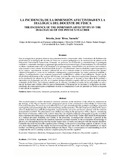Mostrar el registro sencillo del ítem
La incidencia de la Dimensión Afectividad en la Dialógica del Docente de Física
| dc.rights.license | http://creativecommons.org/licenses/by-nc-sa/3.0/ve/ | es_VE |
| dc.contributor.author | Briceño, Jesús | |
| dc.contributor.author | Rivas, Yasmelis | |
| dc.date.accessioned | 2018-12-12T17:57:51Z | |
| dc.date.available | 2018-12-12T17:57:51Z | |
| dc.date.issued | 2018-12-12 | |
| dc.identifier.issn | 1690 – 3226 | |
| dc.identifier.uri | http://www.saber.ula.ve/handle/123456789/45527 | |
| dc.description.abstract | Esta investigación se propuso alcanzar una estructura teórica consensuada sobre la incidencia de la dimensión afectividad en la dialógica del docente de Física en su praxis pedagógica en la construcción de saberes en la Educación Universitaria Venezolana. Centrada en procesos socioculturales y orientada bajo el paradigma cualitativo, sustentado ontológica y epistemológicamente en la fenomenología y la hermenéutica. La información se obtuvo mediante entrevista en profundidad a los protagonistas, representados por profesores universitarios seleccionados con el criterio denominado bola de nieve. Los fenómenos fueron estudiados según la perspectiva de los sujetos, considerando su marco referencial, sea en el contexto donde se desenvolvieron como agentes subjetivos biográfi cos, como en sus múltiples contingencias experimentadas, las cuales generaron actitudes y saberes. La triangulación como contraste proporcionó credibilidad y validez al procedimiento. Surgió que laafectividad está presente en las acciones del docente, por tanto las emociones representan elementos esencialesen la asimilación de saberes de la Física, es a través del sentir que el docente se hace ideas de la realidad e interactúa con el educando, por ello, no se pueden desligar del plano cognitivo del ser, en el proceso de enseñar contenidos de la Física. Se evidencio además que la empatía, constituye el motor de las actividades en aula y una de las bases más sólidas sobre las que se fundamenta el bienestar de los docentes y la dialógica docenteestudiante, de consecuencia para comprender en toda su complejidad el acto de aprender en Física se requiere ir más allá de lo cognitivo. | es_VE |
| dc.language.iso | es | es_VE |
| dc.publisher | SaberULA | |
| dc.rights | info:eu-repo/semantics/openAccess | es_VE |
| dc.subject | Educación | es_VE |
| dc.subject | Formación permanente | es_VE |
| dc.subject | Modelos de formación | es_VE |
| dc.title | La incidencia de la Dimensión Afectividad en la Dialógica del Docente de Física | es_VE |
| dc.type | info:eu-repo/semantics/article | es_VE |
| dcterms.dateAccepted | 13/01/2017 | |
| dcterms.dateSubmitted | 27/07/2016 | |
| dc.description.abstract1 | This research aimed to reach a theoretical consensus structure on the incidence of the affectivity dimension in the dialogic of the Physics teacher in his pedagogical praxis in the construction of knowledge in Venezuelan University Education. Focused on sociocultural processes and oriented under the qualitative paradigm, supported ontologically and epistemologically in phenomenology and hermeneutics. The information was obtained by means of an in-depth interview with the protagonists, represented by university professors selected with the criterion denominated snowball. The phenomena were studied according to the perspective of the subjects, considering their frame of reference, either in the context where they developed as subjective biographical agents, as in their many experienced contingencies, which generated attitudes and knowledge. On the other hand, the triangulation as a contrast provided credibility and validity to the procedure. It emerged that affectivity is present in theactions of the teacher, therefore the emotions represent essential elements in the assimilation of knowledge of physics, it is through the feeling that the teacher makes ideas of reality and interacts with the student, therefore, Cannot be disconnected from the cognitive plane of being, in the process of teaching contents of physics. It was also shown that empathy is the engine of classroom activities and one of the most solid foundations on which teachers’ well-being and teacher-student dialogues are based. This is a consequence of understanding in all its complexity the act of Learning in physics requires going beyond the cognitive. | es_VE |
| dc.description.colacion | 115-139 | es_VE |
| dc.description.email | jesusb@ula.ve | es_VE |
| dc.description.email | yasmeher@hotmail.com | es_VE |
| dc.description.frecuencia | Semestral | |
| dc.identifier.depositolegal | pp 200202 TRI 298 | |
| dc.identifier.eissn | 2244 - 842X | |
| dc.publisher.pais | Venezuela | es_VE |
| dc.subject.institucion | Universidad de Los Andes | es_VE |
| dc.subject.keywords | Dimension affectivity | es_VE |
| dc.subject.keywords | Pedagogical praxis | es_VE |
| dc.subject.keywords | Knowledge of physics | es_VE |
| dc.subject.keywords | Beyond the cognitive | es_VE |
| dc.subject.seccion | Revista Academia: Artículos | es_VE |
| dc.subject.tipo | Artículos | es_VE |
| dc.type.media | Texto | es_VE |
Ficheros en el ítem
Este ítem aparece en la(s) siguiente(s) colección(ones)
-
Academia - Año 17 - Nº 40
Julio-Diciembre 2018


